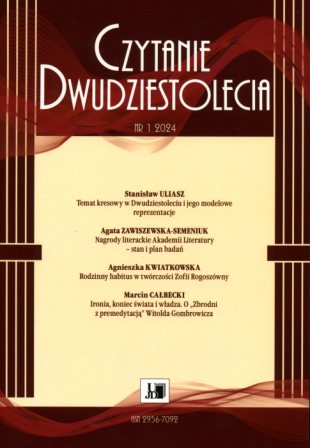A contribution to the history of theater in the interwar period. A few words about Zofia Nałkowska’s Dom kobiet once again
Keywords:
woman, Nalkowska, man, death, betrayal, memory, relativism, cognition, experiment, between the warsAbstract
References
Bachtin M., Problemy poetyki Dostojewskiego, przeł. N. Modzelewska, Państwowy Instytut Wydawniczy, Warszawa 1970.
Dąbrowska M., „Dom kobiet” Zofii Nałkowskiej, [w:] tejże, Pisma rozproszone, red. i przypisy E. Korzeniewska, t. 2, Wydawnictwo Literackie, Kraków 1964, s. 525–534.
Duniec K., Dwudziestolecie. Przedstawienia, Instytut Teatralny im. Zbigniew Raszewskiego, Warszawa 2017.
Hernik-Spalińska J., Rodzaju żeńskiego, „Dialog” 1996, z. 3, s. 150–158.
Greń Z., Powrót do „Domu kobiet”, „Życie Literackie” 1955, nr 27, s. 3.
Grubiński W., Zofia Nałkowska, Dom kobiet (recenzja), „Nowa Książka” 1938, nr 6, s. 345–346.
Ibsen H., Dramaty, Państwowy Instytut Wydawniczy, Warszawa 1958.
Irzykowski K., Sprawozdanie teatralne. Teatr Polski, „Dom kobiet”, „Robotnik” 1930, nr 83, s. 2.
Irzykowski K., Sprawozdanie teatralne. Teatr Polski, „Dom kobiet” (Dokończenie), „Robotnik” 1930, nr 84, s. 2.
Irzykowski K., Sprawozdanie teatralne. Teatr Narodowy, „Dzień jego powrotu”, „Robotnik” 1931, nr 141, s. 4.
Jaszcz [J.A. Szczepański], Archipelag kobiet Z. Nałkowskiej, „Głos Ludu” 1948, nr 196, s. 5.
Kowalska U., O dramatach Zofii Nałkowskiej, „Annales Universitatis Mariae Curie-Skłodowska. Sectio F – Nauki Filozoficzne i Humanistyczne” 1961, nr 16, s. 190–211.
Krasiński E., Wokół premiery „Domu kobiet”. Listy z archiwum Arnolda Szyfmana, „Pamiętnik Teatralny” 1974, 3–4 , s. 342–354.
Kraskowska E., Niebezpieczne związki. Jeszcze raz o prozie Zofii Nałkowskiej, „Teksty Drugie” 1996, nr 4(40), s. 71–91.
Książek M., Funkcje konstrukcji stylistycznych w „Granicy” Z. Nałkowskiej, „Przegląd Humanistyczny” 1962, nr 6, s. 107–120.
Kuncewiczowa M., Dom kobiet – dom nawiedzony, „Pamiętnik Warszawski” 1930, z. 2, s. 98–100.
Leopold W., O dramatach Nałkowskiej, „Dialog” 1958, nr 8, s. 118–126.
Majcherek J., Przypisy do „Domu kobiet”, [w:] Z. Nałkowska, Dom kobiet, http://www.e-teatr.pl/pl/programy/2013_12/56470/dom_kobiet_teatr_
polski_warszawa_1990.pdf [dostęp: 2.03.2022].
Maria Przybyłko-Potocka, [hasło w:] Encyklopedia teatru polskiego (osoby), [online] [dostęp: 2.11.2022].
Matuszek G., Upiorne zniewolenie – odkryte i ukryte w dramatach Ibsena, „Napis” 2009, nr 15, s. 243–251.
Nałkowska Z., Dom kobiet, http://www.e-teatr.pl/pl/programy/2013_12/56470/dom_kobiet_teatr_polski_warszawa_1990.pdf [dostęp: 2.03.2022].
Nałkowska Z., Dzienniki, t. 3: 1918–1929, oprac., wstęp i komentarz H. Kirchner, Czytelnik, Warszawa 1988.
Nałkowska Z., Dzienniki, t. 4: 1930–1939, cz. 1: 1930–1934, oprac., wstęp i komentarz H. Kirchner, Czytelnik, Warszawa 1988.
Nałkowska Z., Kobiety, Prószyński i S-ka, Warszawa 2010.
Nałkowska Z., Utwory dramatyczne. Dom kobiet. Dzień jego powrotu. Renata Słuczańska, Czytelnik, Warszawa 1990.
Nałkowska Z., Widzenie bliskie i dalekie, Czytelnik, Warszawa 1957.
Nowaczyński A., Zmowa kobiet w domu poganek, „ABC” 1930, nr 99, s. 8.
Olszewska M.J., W pułapce wspomnień i pamięci. „Dom kobiet” Zofii Nałkowskiej, „Annales Universitatis Mariae Curie-Skłodowska. Sectio FF – Philologiae” 2022, nr 2(40), s. 81–94.
Podhorska-Okołów S., Na progu „Domu kobiet” (przed premierą w Teatrze Polskim), „Wiadomości Literackie” 1930, nr 1, s. 2.
Podhorska-Okołów S., Przed premierą. (Wywiad z Zofią Nałkowską), „Bluszcz” 1931, nr 11, s. 3.
Poskuta-Włodek D., Zmowa kobiet? Inscenizacje feministyczne w polskim teatrze dwudziestolecia międzywojennego, „Przestrzenie Teorii” 2015, z. 23, s. 105–120.
Prapremiera „Domu kobiet” Nałkowskiej, https://encyklopediateatru.pl/artykuly/10417/prapremiera-domu-kobiet-nalkowskiej [dostęp: 5.03.2022].
Rawiński M., Dramaturgia polska 1918–1939, Państwowy Instytut Wydawniczy, Warszawa 1993.
Rogatko B., Zofia Nałkowska, Państwowy Instytut Wydawniczy, Warszawa 1980.
Sławiński J., Pozycja narratora w „Nocach i dniach” Marii Dąbrowskiej, [w:] Pięćdziesiąt lat twórczości Marii Dąbrowskiej, red. E. Korzeniowska, Państwowy Instytut Wydawniczy, Warszawa 1963, s. 82–99.
Słonimski A., Dramat Nałkowskiej, „Wiadomości Literackie” 1931 nr 17, s. 4.
Słonimski A., Dwie premiery, „Wiadomości Literackie” 1930, nr 13, przedr. w: tegoż, Gwałt na Melpomenie, Wydawnictwa Artystyczne i Filmowe, Warszawa 1966, s. 169–171.
St. Br., Pryzmat rzeczywistości społecznej. Rozmowa z Zofią Nałkowską, „Czas” 1936, nr 25, s. 8.
Wójcik W., Zofia Nałkowska, Wiedza Powszechna, Warszawa 1973.
Żeleński (Boy) T., Premiera w Teatrze Polskim, „Kurier Poranny” 1930, nr 85; przedr. w: tegoż, Flirt z Melpomeną. Wieczór IX i X, Pisma, seria IV, t. 23, Państwowy Instytut Wydawniczy, Warszawa 1965.
Downloads
Published
Issue
Section
License
Copyright (c) 2025 Maria Jolanta Olszewska

This work is licensed under a Creative Commons Attribution 4.0 International License.


